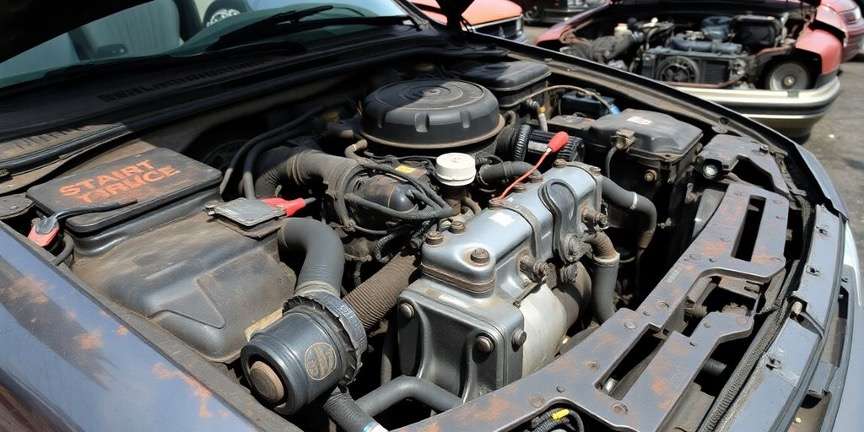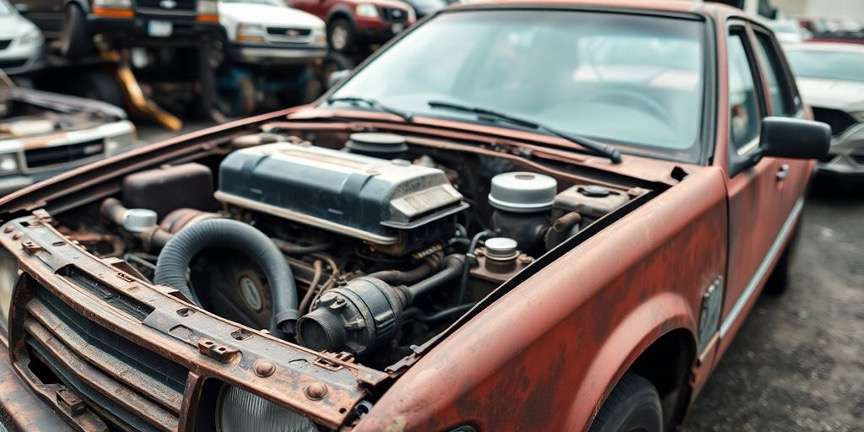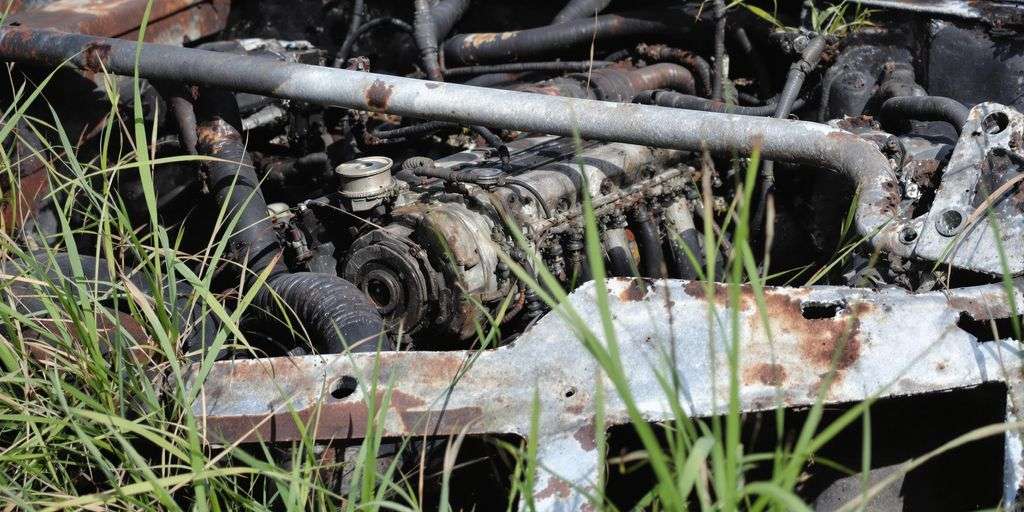Key Takeaways
- Selling a car with a blown engine is possible, but requires transparency about its condition.
- Legal paperwork like a bill of sale and proper title transfer are crucial to avoid future hassles.
- Deciding between repairing the engine or selling the car as-is depends on costs and your car's overall state.
- Parting out the car can sometimes yield more money than selling it whole, especially if valuable parts are intact.
- Different selling methods, like junkyards or online platforms, offer various pros and cons in terms of speed and payout.
Understanding the Challenges of Selling a Junk Car with a Blown Engine

What Constitutes a Blown Engine?
A blown engine typically means severe damage that leaves the engine unusable. This can include things like cracked engine blocks, busted pistons, or broken rods. These issues often mean the engine is beyond repair, at least in a cost-effective way. Causes can range from overheating to lack of oil or even manufacturing flaws. Essentially, a blown engine turns your car into a big, heavy paperweight.
Common Causes of Engine Failure
Engines fail for a bunch of reasons:
- Overheating: Running too hot can warp parts and lead to major failures.
- Poor Maintenance: Skipping oil changes or ignoring strange noises can be a recipe for disaster.
- Manufacturing Defects: Sometimes, it's not your fault at all. Some engines just have bad parts from the start.
Impact on Vehicle Value
When it comes to selling, a blown engine is a huge hit to your car's value. A car with a non-working engine is often only worth its weight in scrap metal. However, selling junk cars for parts is still feasible. Components like the transmission and suspension may still be in good condition and can be sold separately, providing value despite the car's overall state.
Selling a car with a blown engine isn't easy, but it's not impossible. Understanding the damage and knowing what parts still hold value can make a big difference.
Legal Considerations When Selling a Car with a Blown Engine
Importance of a Bill of Sale
When selling a car with a blown engine, having a detailed bill of sale is crucial. This document not only formalizes the transaction but also protects both parties by clearly outlining the condition of the vehicle. Make sure the bill of sale includes:
- The full names and addresses of both the buyer and seller.
- The vehicle identification number (VIN).
- The agreed sale price.
- A statement of the car’s condition, especially noting the blown engine.
Disclosure of Engine Issues
Transparency is key when selling a car with a blown engine. It's not just good practice; it’s often required by law. Disclosing the engine's condition helps avoid future disputes and builds trust with the buyer. If you fail to disclose such critical information, the buyer might have grounds for legal recourse, especially if the purchase price is over $1500. For instance, if a used vehicle sold ‘as is' breaks down after purchase without prior disclosure of issues, legal recourse may be available even if the seller is a private individual.
Proper Title Transfer
Transferring the title correctly is another essential step. This process officially moves ownership from you to the buyer and releases you from future liabilities. To ensure a smooth transfer:
- Sign the title in the designated area for sellers.
- Clear any liens on the title before the sale.
- Notify your local Department of Motor Vehicles (DMV) about the sale to update their records and protect yourself from any future claims or fines related to the vehicle.
Ensuring you handle these legal considerations properly can save you from headaches down the road. It’s about crossing your t's and dotting your i's to make sure everything is in order.
Exploring Options: Should You Repair or Sell Your Car As-Is?
Cost of Engine Repair vs. Replacement
Dealing with a blown engine is no small feat. Repairing it can be super expensive, often running into thousands of dollars. Mechanics usually need to take apart the whole engine to find and fix the problem, which can take weeks or even months. Plus, once they start, they might find other issues that need fixing, adding more to the bill. If you're thinking about fixing the engine, it's smart to check out the whole car's condition and think about the money side of things. Sometimes, it just makes more sense to sell the car as it is.
Evaluating the Car's Overall Condition
Before you dive into repair bills, take a good look at your car. Is it just the engine, or are there other things that need fixing? Consider the age of the car, the mileage, and any past issues. If the car's been a bit of a troublemaker, you might be better off letting it go. But if it's in decent shape otherwise, maybe fixing it could be worth it. Think about how much the car means to you, too. Sometimes, sentimental value can tip the scales.
Market Demand for Non-Running Cars
Believe it or not, there's a market for cars that don't run. Some folks are on the lookout for project cars or need parts for their own repairs. Check out what similar cars are selling for in your area. You might find that selling your car as-is could be a good move, especially if there's a demand for parts or if someone wants to take on a fixer-upper project.
Selling a non-running car can be less of a headache than dealing with endless repairs. Weighing your options carefully can save you time and money.
If you're in Colorado and looking for a quick way to sell, ByeCar's solution might be just what you need. They specialize in buying cars with engine issues, making the process smooth and fast.
Maximizing Value: Selling Your Car for Parts
Identifying Valuable Components
When your car's engine is shot, you might think it's worthless, but that's not entirely true. Some parts can still fetch a good price. Even with a blown engine, components like the alternator, starter motor, and fuel injectors might still be in demand. Don't overlook the transmission either; if it's in decent shape, it can be quite valuable. Other parts to consider include:
- Body panels and bumpers: Often needed for repairs.
- Interior elements: Seats, dashboards, and infotainment systems can sell well.
- Wheels and tires: Specialty items like alloy wheels are always sought after.
- Catalytic converter: Contains precious metals that are worth a lot.
Safe Dismantling Practices
Taking apart your car isn't just about grabbing a wrench and going to town. Safety is key. Here are some basic tips:
- Gather the right tools: Make sure you have wrenches, screwdrivers, and jacks ready.
- Use protective gear: Gloves, goggles, and sturdy clothing are a must.
- Ensure a stable environment: Work on a flat surface and secure the car to prevent tipping.
- Disconnect the battery: This prevents electrical hazards.
- Drain fluids: Properly dispose of oil, coolant, and brake fluid to avoid environmental damage.
Pricing and Selling Individual Parts
Once you've got everything dismantled, it's time to sell. But how do you price these parts? First, research the market value of each component. This gives you a baseline for pricing. Consider these tips:
- Clean and test parts: A clean, working part is more appealing.
- Bundle small items: Grouping related parts can make them more attractive.
- Be open to negotiation: Know your lowest acceptable price.
Finally, don't forget to offer shipping to widen your market. With these steps, you can make sure you're getting the most out of your junk car.
Choosing the Right Selling Method for Your Junk Car
Selling to a Junkyard or Scrap Yard
If you're looking for a quick and hassle-free way to get rid of your junk car, selling it to a junkyard or scrap yard could be your best bet. These places specialize in taking unwanted vehicles off your hands, usually offering you a price based on the car's weight in scrap metal. It's a fast transaction, but keep in mind that the payout might be on the lower end. Getting multiple quotes from different yards can help you secure the best deal without much effort.
Trading In at a Dealership
Trading your car in at a dealership might sound convenient, especially if you're planning to buy another vehicle. However, dealerships typically focus on cars that are ready to hit the road, so an engineless car might not fetch you much. Often, the offer will be in the form of credit towards a new purchase rather than cash. Consider this option only if you're prepared for a potentially low trade-in value.
Private Sale vs. Online Platforms
Selling your car privately can be more lucrative, but it's a slower process. You'll need to sift through potential buyers who are willing to take on a car that needs significant repairs. On the other hand, online platforms like DamagedCars can offer a quick sale and a fair market value. These platforms are designed to handle cars in less-than-perfect condition, providing a balance between speed and payout. They often include perks like free towing, which can make the process smoother and more appealing.
Setting a Fair Price for a Car with a Blown Engine
Researching Market Prices
Understanding the market is crucial when you're trying to sell a car with a blown engine. Start by checking out online listings for similar cars. Websites like Craigslist, eBay Motors, and Facebook Marketplace are good places to see what others are asking for comparable vehicles. This will give you a ballpark figure of what your car might be worth in its current state. Remember, prices can vary widely depending on the make, model, and condition of the car.
Highlighting Other Valuable Features
Even if the engine is toast, your car might still have some redeeming qualities. Consider features like a well-maintained interior, new tires, or aftermarket parts. These can add some value to your car and might make it more appealing to potential buyers. When negotiating, make sure to highlight these aspects. They might not completely offset the engine issue, but they can certainly help.
Negotiating with Potential Buyers
When it comes to negotiating, be prepared for a bit of back and forth. Buyers might try to lowball you because of the blown engine, but stick to your research. Having a few offers from junkyards or salvage yards can give you a better understanding of your car's worth. It's also a good idea to be transparent about the car's condition. This honesty can build trust and potentially lead to a smoother transaction.
Setting a fair price for a car with a blown engine isn't just about numbers; it's about understanding what your car still offers and finding the right buyer who sees its potential. With a bit of research and some patience, you can strike a deal that feels right.
Tips for a Smooth Transaction When Selling a Junk Car

Gathering Necessary Documentation
First things first, make sure you have all the paperwork ready before you start the selling process. This includes the car's title, any maintenance records, and a recycling certificate or confirmation if the buyer requires it. Having these documents on hand not only speeds up the process but also builds trust with potential buyers.
Advertising Transparently
When you're putting your car out there, be upfront about its condition. This means mentioning the blown engine and any other issues in your listing. Transparency not only sets the right expectations but also saves you time by weeding out uninterested buyers. Use clear, honest descriptions and, if possible, include photos that show the car's condition.
Finalizing the Sale with Proper Paperwork
Once you've found a buyer, it's crucial to wrap things up properly. Start by drafting a bill of sale that outlines the terms of the sale, including the price and any conditions. Both you and the buyer should sign this document. Next, ensure the title is transferred correctly to avoid any future liabilities. Finally, notify your local DMV about the sale to officially remove the car from your name.
Selling a junk car might seem daunting, but with the right steps, it can be a straightforward process. Having your paperwork in order and being honest in your advertising are key to a smooth transaction.
Conclusion
Selling a junk car with a blown engine might seem like a headache, but it's totally doable with the right game plan. First off, decide what's more important to you—getting rid of the car quickly or squeezing out as much cash as possible. If speed's your thing, a junkyard or dealership trade-in might be your best bet. But if you're patient and want to maximize your return, selling parts or finding a private buyer could be the way to go. Just remember, even a car that's not running has some value, whether it's in the parts or the metal. So, take your time, weigh your options, and choose the path that fits your needs best. Who knows, you might even learn a thing or two along the way!
Frequently Asked Questions
Can I sell a car with a blown engine?
Yes, you can sell a car with a blown engine. There are buyers interested in such vehicles for parts or as a project car.
How do I price a car with a blown engine?
Research similar cars with engine issues to set a fair price. Consider the value of parts and the condition of the rest of the car.
Should I repair the engine before selling the car?
It depends. If the repair costs are too high compared to the car's value, selling as-is might be a better option.
What documents do I need to sell a car with a blown engine?
You'll need the car's title, a bill of sale, and any repair estimates or records. Being transparent about the car's condition is important.
Can I sell the car for parts instead of whole?
Yes, selling the car for parts can sometimes bring more money, especially if valuable components are still in good condition.
Is it better to sell privately or to a junkyard?
Selling privately might get you a higher price, but a junkyard offers a faster and easier sale, often without the need for repairs.



